

7 Essential Facts About Emotional Support Animal Pennsylvania Rights
by Lena Park
Last updated: July 25, 2025
Verified and Approved by:
Angela Morris,
MSW, LCSW
Fact Checked

Overview
This article sheds light on the rights and regulations surrounding emotional support animals (ESAs) in Pennsylvania, aiming to provide essential information for individuals who may be navigating these complex issues.
Many people face emotional challenges that can be overwhelming, and it’s important to acknowledge the struggles that come with mental health concerns.
ESAs play a vital role in offering support under the Fair Housing Act, allowing individuals with valid ESA letters to reside with their beloved animals in housing that typically prohibits pets. This connection can be incredibly comforting during difficult times.
Furthermore, the article outlines the legal protections and processes involved in obtaining ESA letters, ensuring that individuals are informed and empowered to seek the support they need.
Remember, you’re not alone in this journey; there are compassionate solutions available to help you thrive.
Introduction
Navigating the intricate landscape of emotional support animal (ESA) rights in Pennsylvania can feel overwhelming for many individuals yearning for comfort and companionship. As awareness of mental health continues to grow, it becomes increasingly important to understand the legal framework surrounding ESAs. This knowledge is vital for those who depend on these cherished companions for emotional support.
In this article, we will explore essential facts about Pennsylvania’s ESA laws, offering valuable insights into the rights and protections available to pet owners. Yet, as regulations evolve and challenges in housing, travel, and employment arise, how can ESA owners advocate for their rights while ensuring their needs are met?
Reflecting on your own experiences can be the first step toward empowerment and understanding.
Wellness Wag: Streamlined Process for Obtaining ESA Letters in Pennsylvania
Navigating mental health challenges can be overwhelming, and finding the right support is crucial. Wellness Wag understands these struggles and provides a user-friendly online platform that simplifies the process of obtaining an emotional support animal Pennsylvania letter. Clients begin their journey with a brief assessment to determine eligibility, followed by a compassionate consultation with licensed medical professionals. Once approved, clients receive their official ESA letter within 24 hours, ensuring prompt assistance for their psychological needs. This effective method alleviates the pressure often associated with accessing mental health services, allowing for easier access to the comforting presence of emotional support animals.
Moreover, Wellness Wag is dedicated to customer satisfaction, offering a reassuring money-back guarantee for clients who may feel uncertain about the process or the legitimacy of their ESA letter. This commitment is especially important as the demand for ESA letters continues to rise, with search interest projected to reach 105,000 searches in 2025. Significantly, around 18% of pet owners indicate their pet serves as an ESA, highlighting a growing reliance on these beloved companions. As Vanessa, a licensed clinical social worker, beautifully expresses, “The presence of an ESA can bring relief, reduce loneliness, and provide a sense of purpose.”
Additionally, Wellness Wag offers flexible payment plans starting as low as $32.25, ensuring that their services are accessible to a wider audience. By prioritizing a smooth and supportive experience, Wellness Wag positions itself as a trusted source for individuals in Pennsylvania seeking the therapeutic benefits of an emotional support animal. To embark on this journey, visit their website and complete the initial assessment to discover if you qualify for an ESA letter.
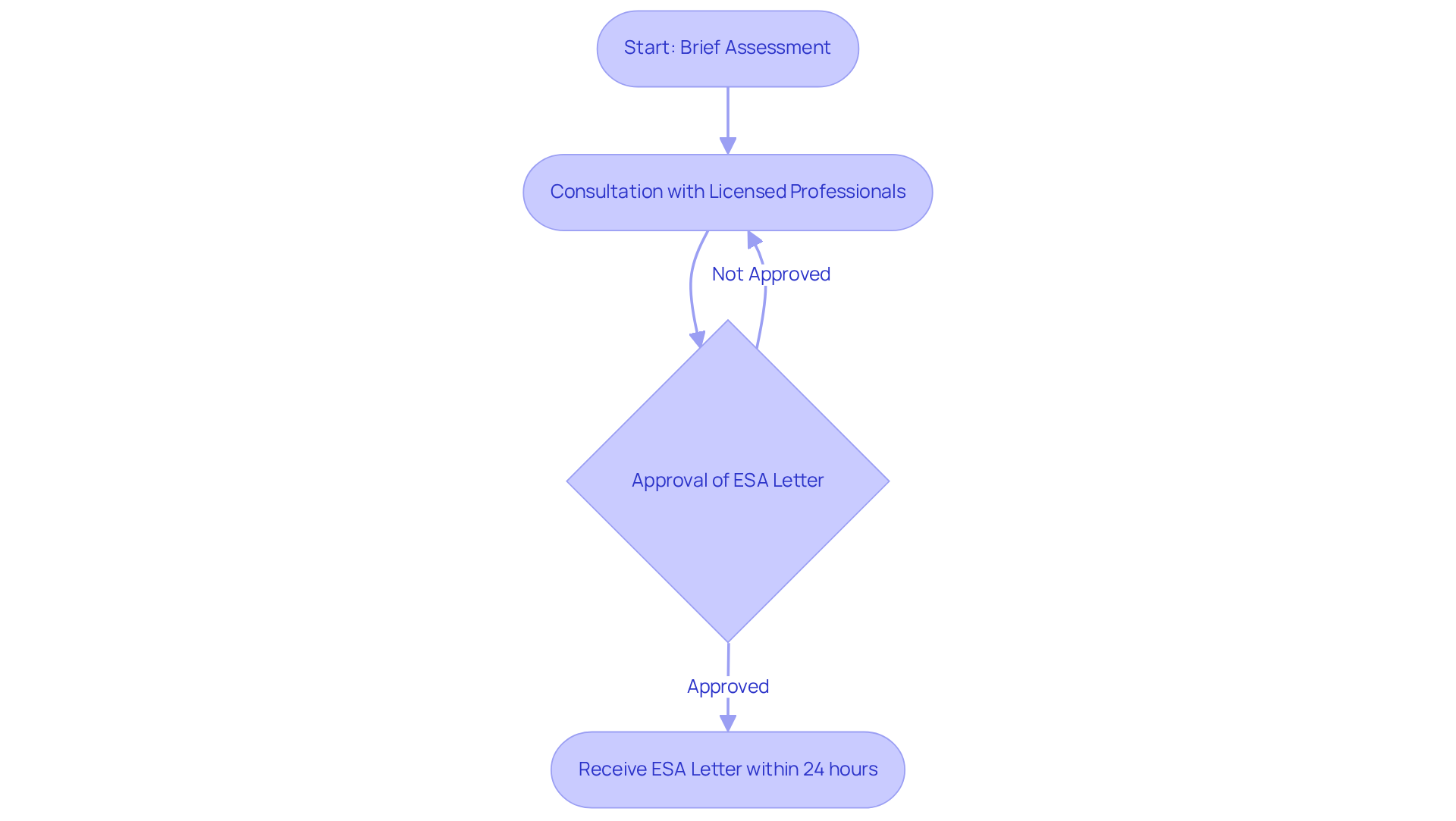
Pennsylvania ESA Laws: Key Regulations and Rights for Pet Owners
In Pennsylvania, individuals facing emotional challenges often find solace in an emotional support animal Pennsylvania, which is protected under the Fair Housing Act (FHA). This law allows those with valid ESA letters to share their homes with their beloved companions, even in residences that typically prohibit pets. To qualify for this support, individuals must obtain a letter from a licensed mental health professional who understands their unique needs, confirming that an ESA is essential due to a mental or psychological disability. While it’s important to note that ESAs do not have the same public access rights as service animals, they are afforded significant protections in housing contexts, allowing individuals to maintain their vital emotional support systems.
Landlords, in their commitment to fostering a supportive environment, are prohibited from imposing pet fees or deposits for ESAs. However, they retain the right to charge for any damages caused by the pet. Community associations also play a crucial role, as they are required to make reasonable accommodations for individuals with disabilities under the FHA. Understanding these regulations is essential for ESA owners, empowering them to navigate housing challenges effectively and assert their rights.
Recent statistics reveal that many individuals in Pennsylvania are utilizing emotional support animal Pennsylvania letters for housing accommodations, highlighting the growing recognition of the therapeutic benefits of pet companionship. Legal experts stress the importance of having proper documentation and being aware of one’s rights, as violations of ESA protections can occur. These may include unwarranted fees, excessive documentation requests, or outright refusals by landlords. By staying informed about these key regulations, ESA owners can advocate for their rights, ensuring compliance with the FHA and fostering a supportive living environment for themselves and their companions.
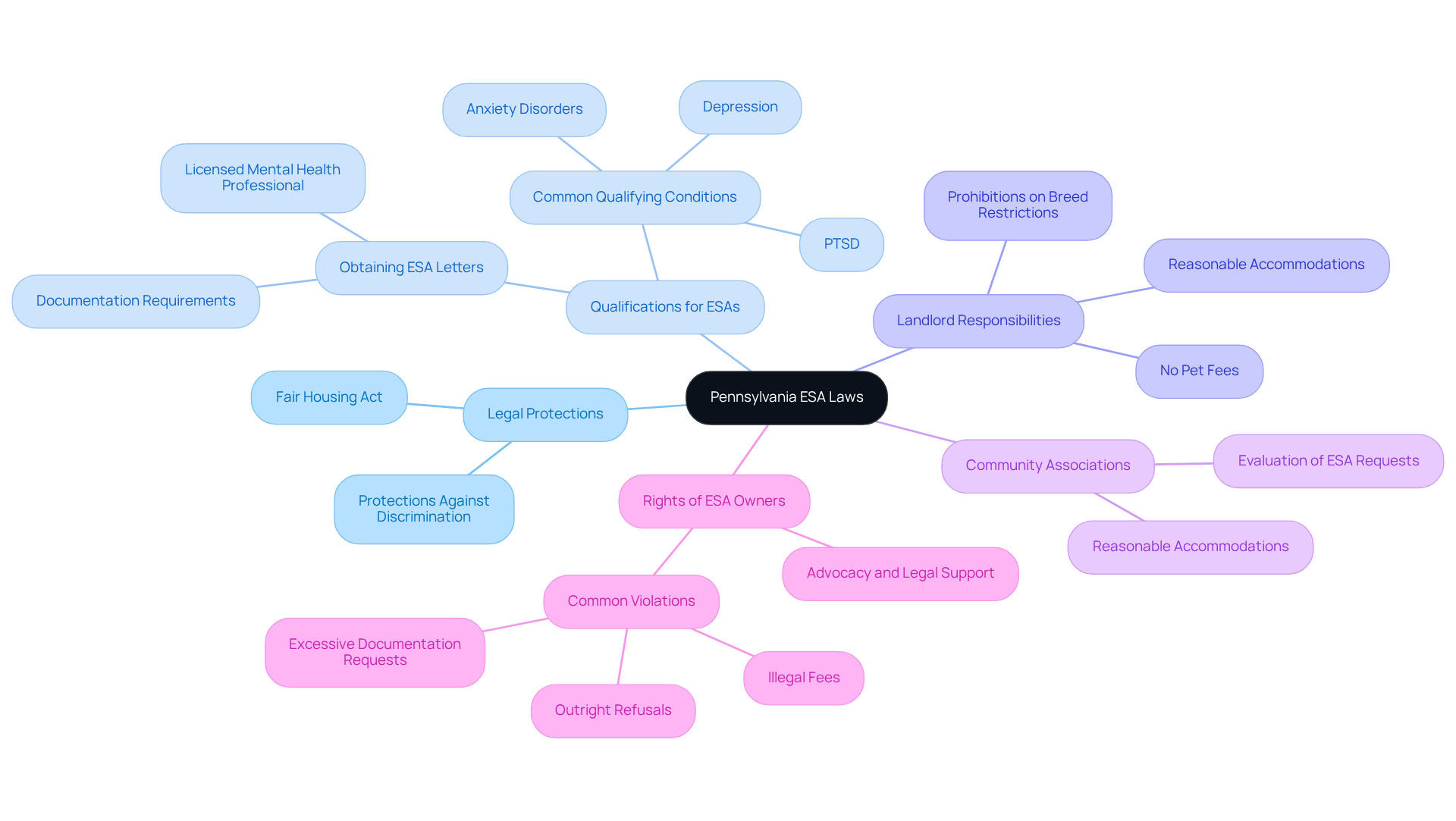
Housing Rights: Protections for Emotional Support Animals in Pennsylvania
In Pennsylvania, individuals who depend on emotional support animals experience vital protections against discrimination in housing. Landlords cannot deny rental applications solely based on the presence of an ESA. The Fair Housing Act further emphasizes that housing providers must make reasonable accommodations for those with disabilities, including allowing emotional support animals in properties that typically prohibit pets. This legal framework is crucial for individuals who depend on their pets for emotional support, ensuring they can find housing in a nurturing environment.
Recent statistics reveal that around 70% of landlords in Pennsylvania are accommodating emotional support animals, highlighting the growing acknowledgment of the essential role of emotional support animals in supporting mental health. Advocates highlight that these protections are vital for preventing discrimination, allowing individuals with support needs to access safe housing options. As attorney J. Courtney Cunningham notes, “These protections help prevent disability discrimination, ensuring that persons with emotional support needs are not unfairly denied housing.”
ESA owners are not required to pay pet fees or deposits; however, they are responsible for any damage their pets may cause. Understanding these rights is essential for individuals navigating the housing market in Pennsylvania, as it empowers them to seek suitable accommodations, including those that allow emotional support animals, without the fear of discrimination. There are numerous examples of successful accommodations, such as landlords modifying their no-pet policies to allow ESAs, illustrating the practical application of these legal protections. As we look ahead to 2025, it is important for ESA owners to stay informed about their rights and advocate for themselves in housing situations.
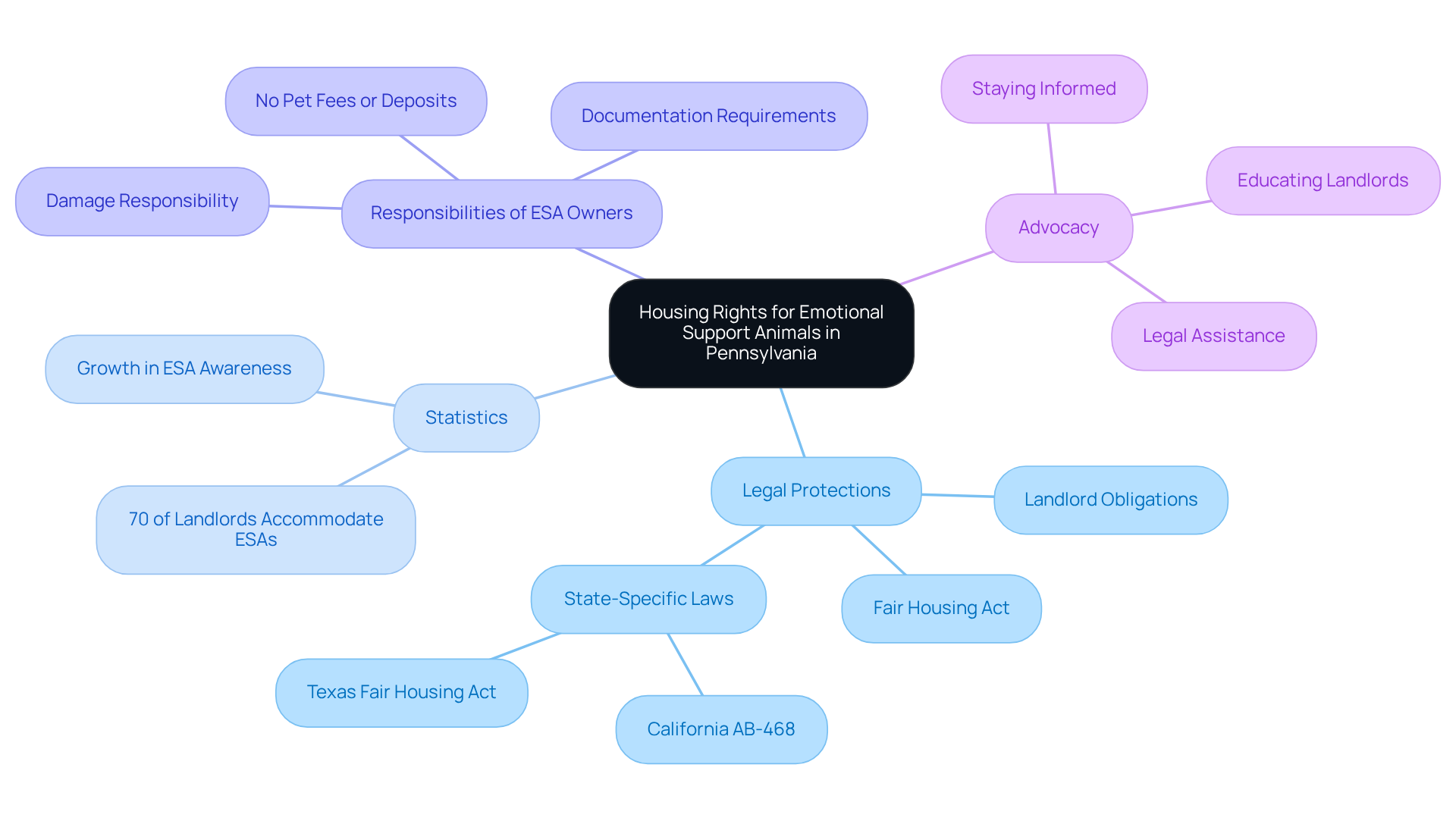
Air Carrier Access Act: Traveling with Your Emotional Support Animal
The Air Carrier Access Act (ACAA) provides a vital opportunity for individuals with emotional support animal Pennsylvania to travel alongside their companions on commercial flights. However, it is essential to navigate the specific regulations set by airlines with care. As we approach 2025, many airlines now require a valid ESA letter from a licensed mental health professional, along with additional documentation that can differ by carrier. For example:
- United Airlines has recently added a requirement for a form to be completed by a therapist in addition to the ESA letter.
- Delta Airlines has introduced a new policy that necessitates a three-part form, which includes input from both a veterinarian and a mental health professional.
Advance notice is often necessary, with some airlines requesting as much as 48 hours before travel. This preparation is crucial, as it empowers ESA owners to effectively manage the complexities of airline policies. Recent statistics reveal that approximately 18% of pet owners in the U.S. have ESAs, highlighting a growing reliance on these beloved companions for emotional support.
Real-world experiences underscore the importance of understanding airline regulations. Many travelers have shared their struggles with American Airlines, citing the extensive documentation required as a source of frustration that can lead to lost trips. It’s worth noting that American Airlines’ policy has remained unchanged since February 2018, which adds to the ongoing challenges faced by those traveling with ESAs. On the other hand, while many airlines continue to accommodate ESAs, it is vital for passengers to verify specific requirements in advance to prevent any complications at the airport.
Ultimately, familiarizing oneself with the ACAA regulations and individual airline policies is essential for ensuring a smooth travel experience with an emotional support animal in Pennsylvania. By securing the proper documentation and engaging in proactive communication, travelers can significantly enhance their chances of a successful journey, allowing them to focus on the comfort and companionship their emotional support animals provide.
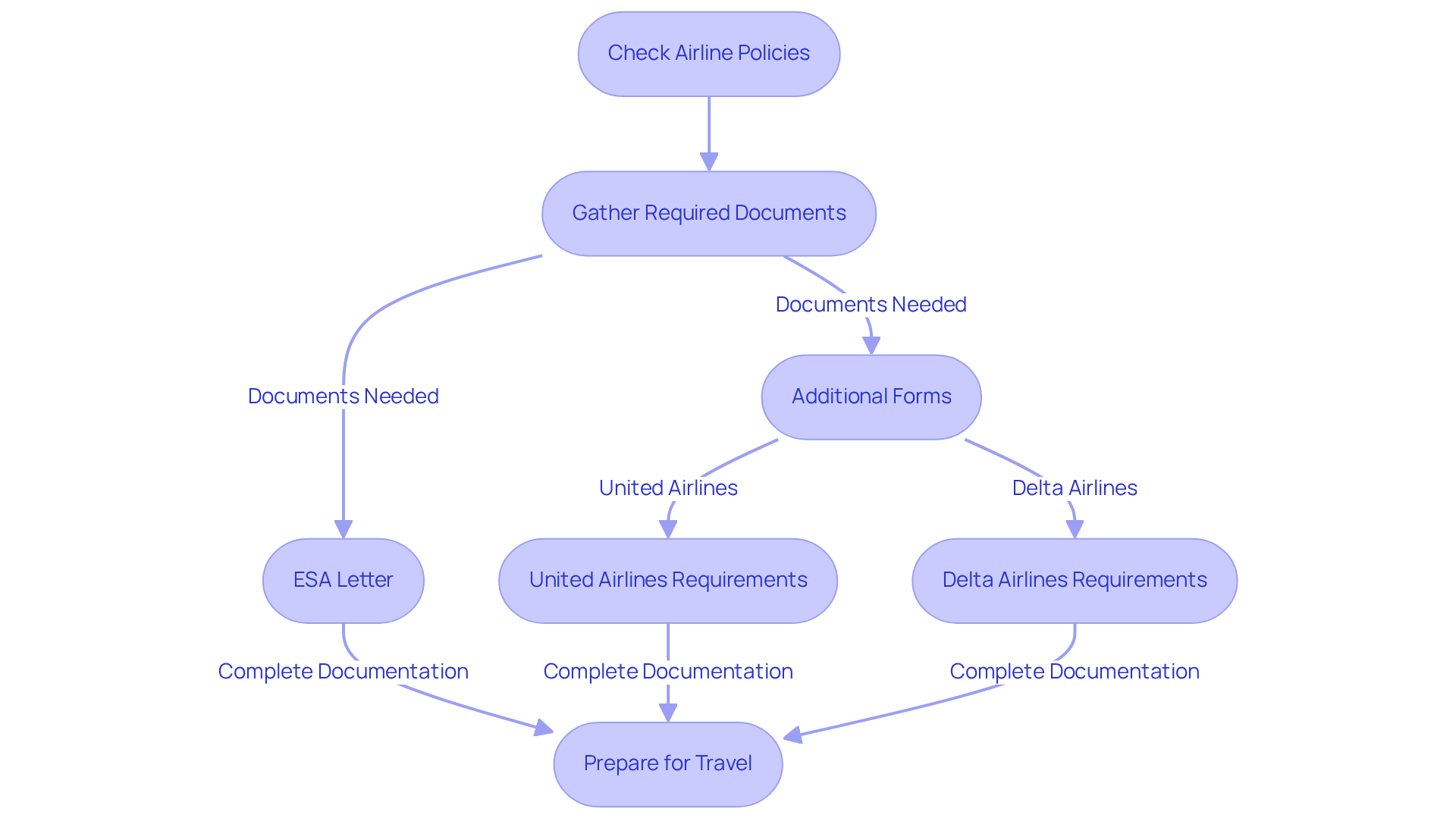
Workplace Rights: Emotional Support Animals and Employment in Pennsylvania
For many individuals facing mental health challenges, the journey can often feel overwhelming and isolating. While emotional support animals in Pennsylvania do not have the same access rights as service animals in public spaces, there is hope for those seeking comfort in the workplace. Under the Americans with Disabilities Act (ADA), employers are encouraged to provide reasonable accommodations for employees with disabilities, which may include allowing an emotional support animal Pennsylvania to be present at the workplace.
If you are considering bringing your ESA to work, it’s important to communicate your needs with your employer. Sharing appropriate documentation, like a valid ESA letter from a licensed mental health professional, can help facilitate this conversation. Remember, while employers are not required to permit ESAs, they are obligated to engage in an interactive process to explore potential accommodations that could support your well-being.
It’s essential to approach this process with honesty. Misrepresenting a pet as an ESA can lead to serious legal repercussions, including fines and criminal charges. This reality highlights the importance of obtaining legitimate letters for an emotional support animal Pennsylvania to ensure that your needs are met without complications. Additionally, under the Fair Housing Act, landlords cannot impose extra fees for support animals, which is an important consideration for those looking at housing options alongside workplace requests.
Human Resources professionals emphasize the significance of understanding your rights regarding emotional support animals in Pennsylvania. They recognize that while employers must consider accommodation requests, each situation is unique and should be evaluated on its own merits. This thoughtful approach aims to balance the needs of the employee with the operational requirements of the workplace, fostering an environment of understanding and support.
In navigating these challenges, remember that you are not alone. There are resources and support systems available to help you through this process, ensuring that your emotional needs are acknowledged and addressed.

Addressing ESA Discrimination: Legal Recourse for Pet Owners
Owners of an emotional support animal in Pennsylvania often face the distressing challenge of discrimination in housing or employment. This situation can feel isolating and overwhelming, but there are legal avenues available to help. One such option is to file complaints with the U.S. Department of Housing and Urban Development (HUD) regarding housing discrimination. This has become increasingly important, as there has been a notable rise in complaints in recent years. For instance, HUD charged a landlord in St. Paul in 2020 for discriminating against an ESA owner, highlighting the significance of legal protections in these circumstances. Recent statistics indicate that complaints filed with HUD concerning ESA discrimination have risen significantly, reflecting a growing awareness of these rights.
To effectively support their claims, ESA owners are encouraged to meticulously document any instances of discrimination they encounter. Keeping detailed records of communications with landlords or employers, along with any relevant interactions that illustrate unfair treatment, can be invaluable. Legal experts specializing in disability rights can provide essential support, guiding individuals through the complexities of their cases and advocating for their rights.
As we look ahead to 2025, it remains vital for owners of emotional support animals in Pennsylvania to understand their rights under the Fair Housing Act (FHA), which mandates reasonable accommodations for individuals with disabilities, including those who require support animals. Engaging with legal professionals can empower these individuals to file successful complaints and ensure their rights are respected. Additionally, organizations like Wellness Wag offer a money-back guarantee, reinforcing their commitment to customer satisfaction and the legitimacy of their services. This can serve as a valuable resource for ESA owners seeking the support they need during challenging times.
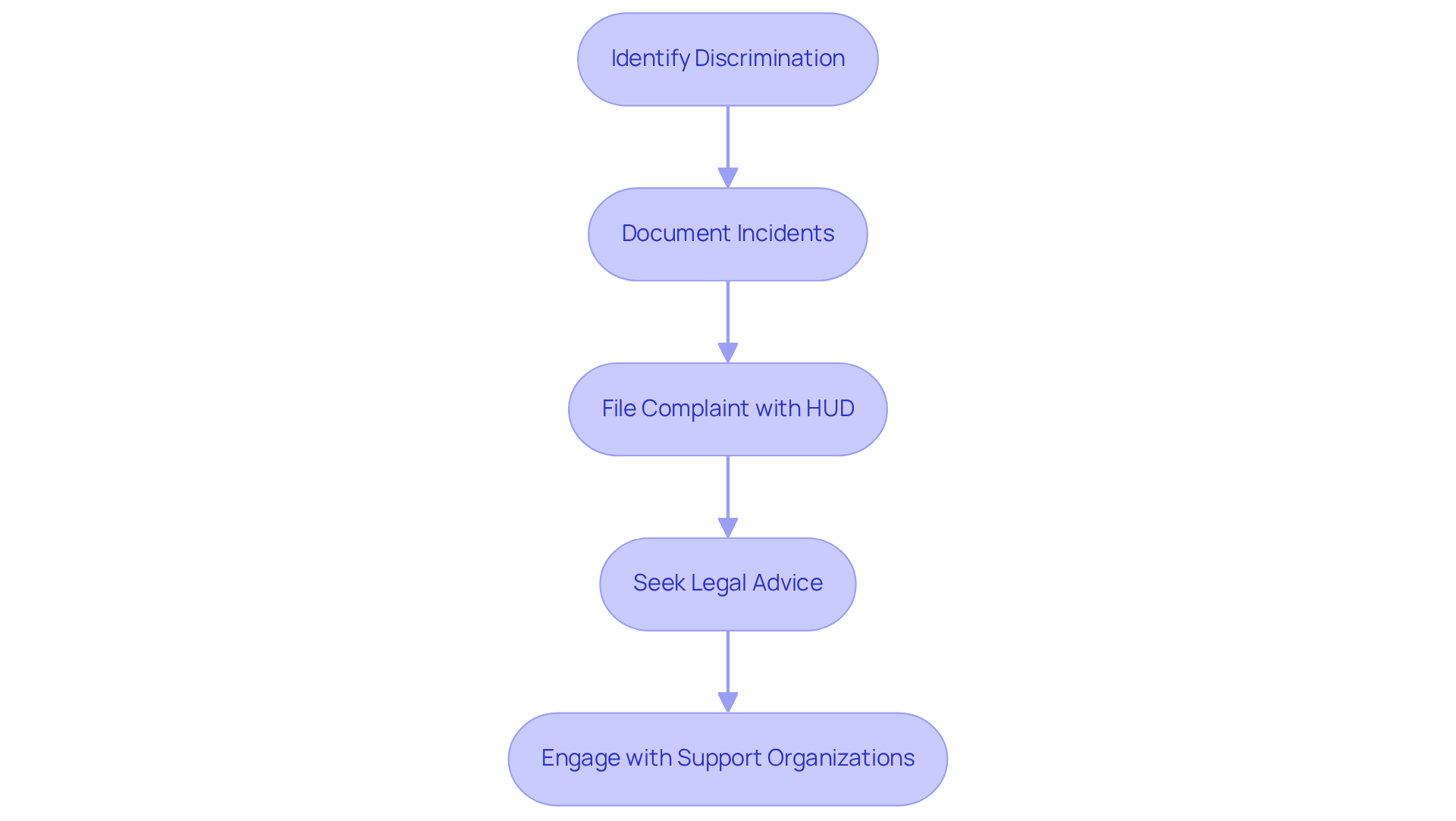
Qualifying for an ESA: Essential Criteria and Documentation
In Pennsylvania, to be eligible for an emotional support animal Pennsylvania, individuals must have a diagnosed mental or psychological disability, confirmed by a licensed mental health professional. This compassionate expert will provide an ESA letter that expresses the necessity of the animal for the individual’s well-being. Common qualifying conditions include anxiety, depression, PTSD, and other psychological disorders. It’s noteworthy that approximately 18% of pet owners in the U.S. identify their animals as ESAs, with 88% of ESA owners reporting a positive impact on their mental health. This trend reflects a growing reliance on pets for emotional support.
The journey begins with a preliminary evaluation to assess the person’s mental health needs, followed by a consultation with a licensed professional. Once approved, clients typically receive their ESA letter within 48 hours. This letter is crucial for securing housing and travel accommodations, easing access to pet-restricted areas, and empowering individuals to advocate for their rights under the Fair Housing Act and the Air Carrier Access Act. It’s important to remember that the emotional support animal Pennsylvania letter is only valid for one year.
Mental health experts emphasize the importance of a thorough diagnostic process, noting that a valid ESA letter must be based on an extensive assessment of the individual’s mental health condition. Additionally, individuals should be wary of scams when seeking ESA letters to ensure they receive authentic documentation. Real-life stories demonstrate the profound positive effects of ESAs; many individuals report increased psychological resilience and improved daily routines after obtaining their letters. Understanding these criteria and the necessary documentation equips individuals to navigate the process with confidence, ensuring they can access the support they need.
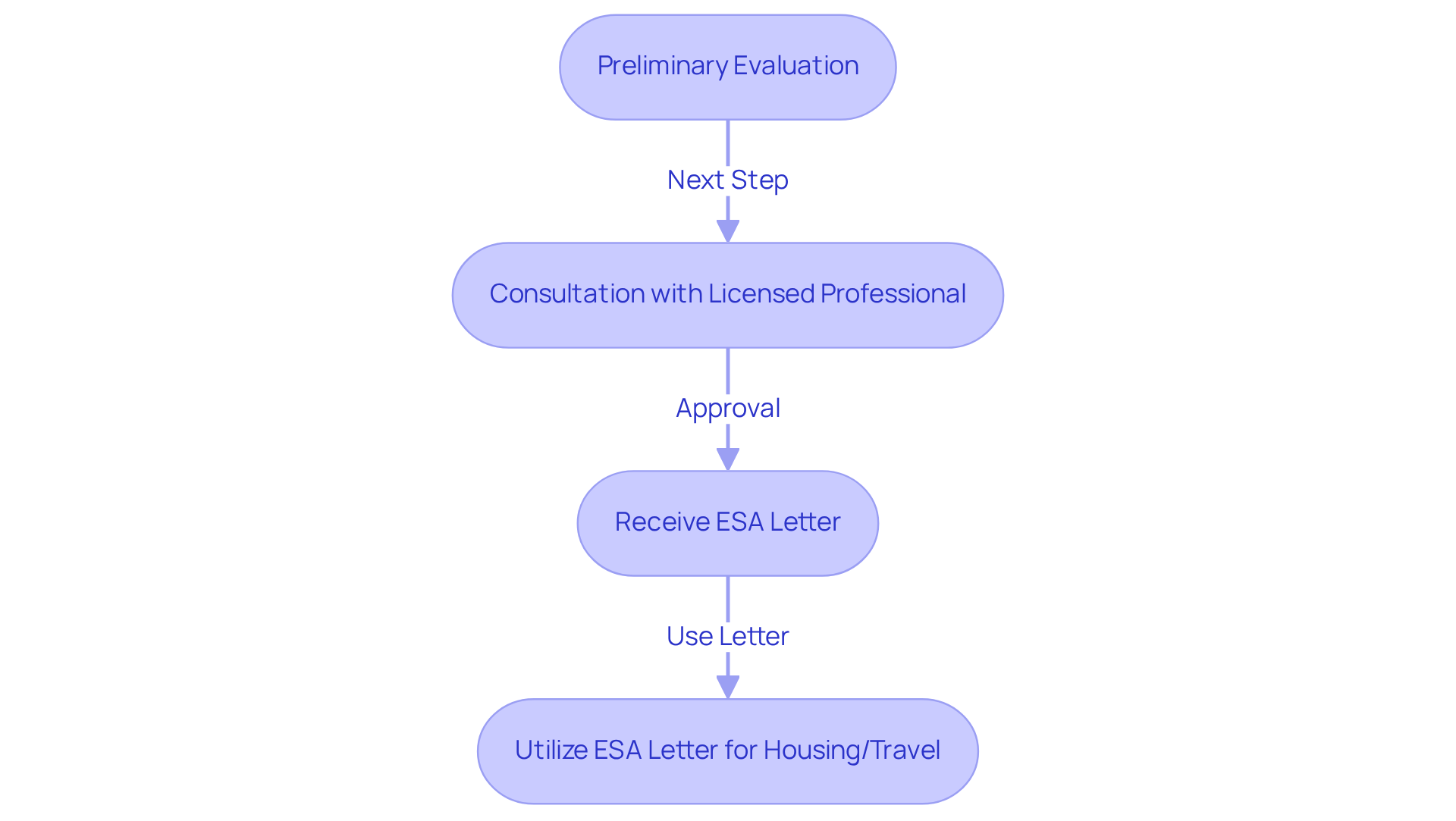
Public Transportation: Rights for Emotional Support Animals in Pennsylvania
In Pennsylvania, emotional support animal Pennsylvania (ESAs) face unique challenges regarding access on public transportation. Unlike service animals, an emotional support animal in Pennsylvania may not be allowed on buses, trains, or other public transit systems, which can be disheartening for those who rely on their companionship. It’s important to recognize the emotional weight of this limitation and how it can affect travel plans and overall well-being.
For those with an emotional support animal in Pennsylvania, understanding these restrictions is crucial. While guaranteed access to public transportation may not be available, there are alternative travel options to consider. Engaging with transportation providers about specific needs can open doors to accommodations that make travel easier. By being proactive and informed, individuals can navigate these challenges more effectively and find supportive solutions.
Remember, you are not alone in this journey. Many people share similar experiences, and there are resources available to help you advocate for your rights. Exploring different travel methods or seeking accommodations can lead to a more positive experience, allowing you to enjoy the companionship of your emotional support animal Pennsylvania while traveling. Your emotional support animal is there for you, and together, you can find ways to make your travel as smooth as possible.
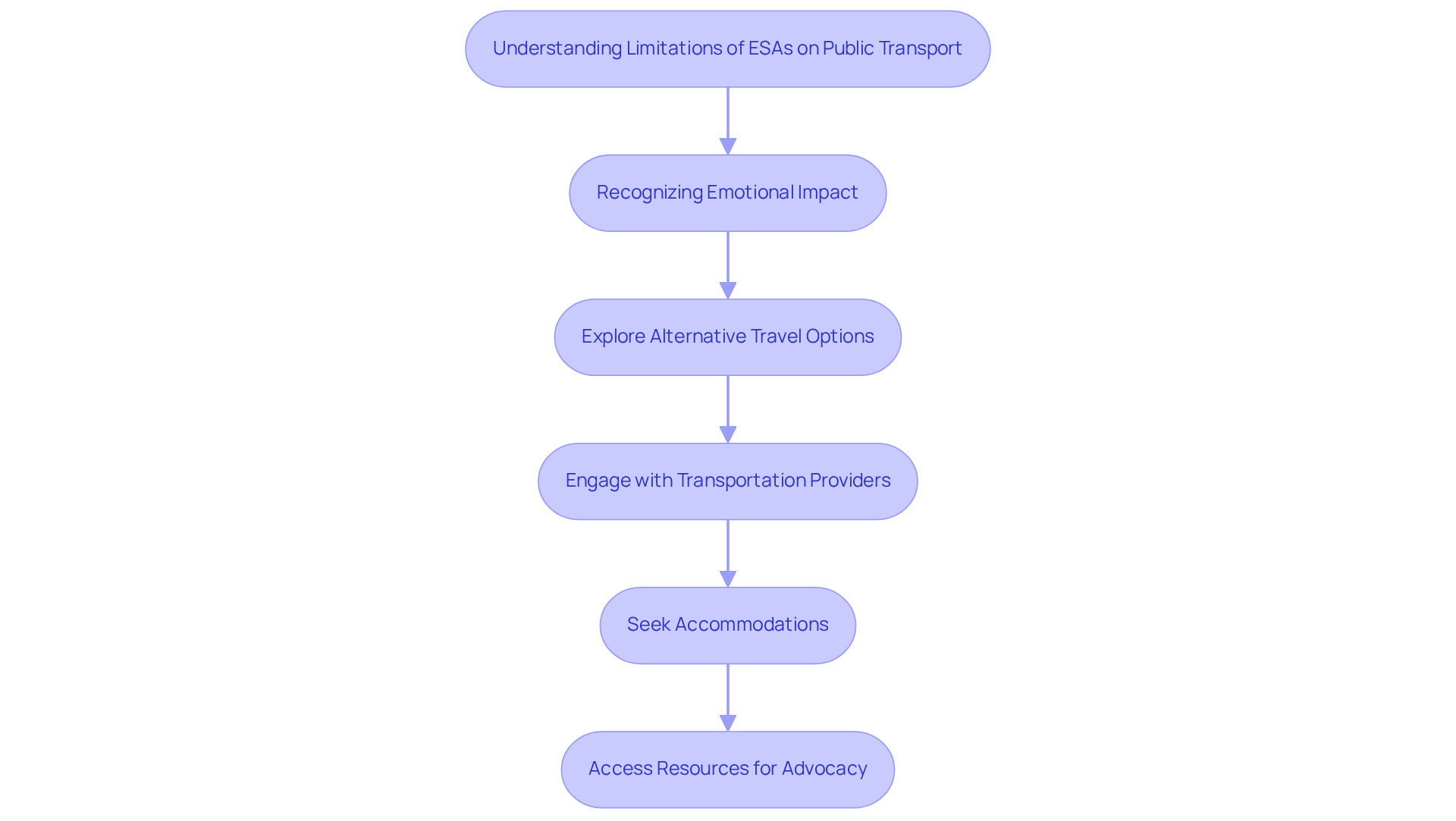
Service Animals vs. Emotional Support Animals: Understanding the Distinctions
Differentiating between assistance creatures and support companions (ESAs) is crucial, as they are governed by various laws and regulations that can significantly impact individuals’ lives. Assistance creatures, specifically trained to perform tasks for people with disabilities, enjoy broader access rights under the Americans with Disabilities Act (ADA). This includes entry into public spaces where pets are typically not allowed, providing essential support for those in need. In contrast, support creatures offer comfort and companionship but do not require specialized training, which can lead to restricted public access rights that may leave ESA owners feeling vulnerable.
In Pennsylvania, understanding these distinctions is vital for owners of emotional support animals, especially concerning housing and travel accommodations. The Fair Housing Act mandates suitable adjustments for emotional support animals in housing contexts, allowing individuals to reside with their emotional support companions even in pet-restricted settings. However, it is important to note that ESAs do not possess the same rights as service creatures in public areas. This discrepancy can create confusion and difficulties for owners, leaving them feeling uncertain about their rights.
Research indicates that a significant portion of the public is unaware of these differences, which can hinder ESA owners’ ability to advocate for their rights effectively. For instance, 52.61% of fair housing complaints in 2023 were related to disability discrimination, underscoring the challenges faced by ESA owners. Real-life examples illustrate the importance of having valid ESA documentation, as many individuals face discrimination in housing due to ‘no pet’ policies. Legal experts stress that while service creatures are protected under the ADA, a valid ESA letter from a licensed mental health professional is a legal requirement for ESAs. This highlights the necessity for ESA owners to be informed and prepared to advocate for themselves.
To effectively advocate for their rights, ESA owners should ensure they have the proper documentation and stay informed about their legal protections. This proactive approach can empower them to navigate the complexities of their situations, fostering a sense of security and support in their journey.
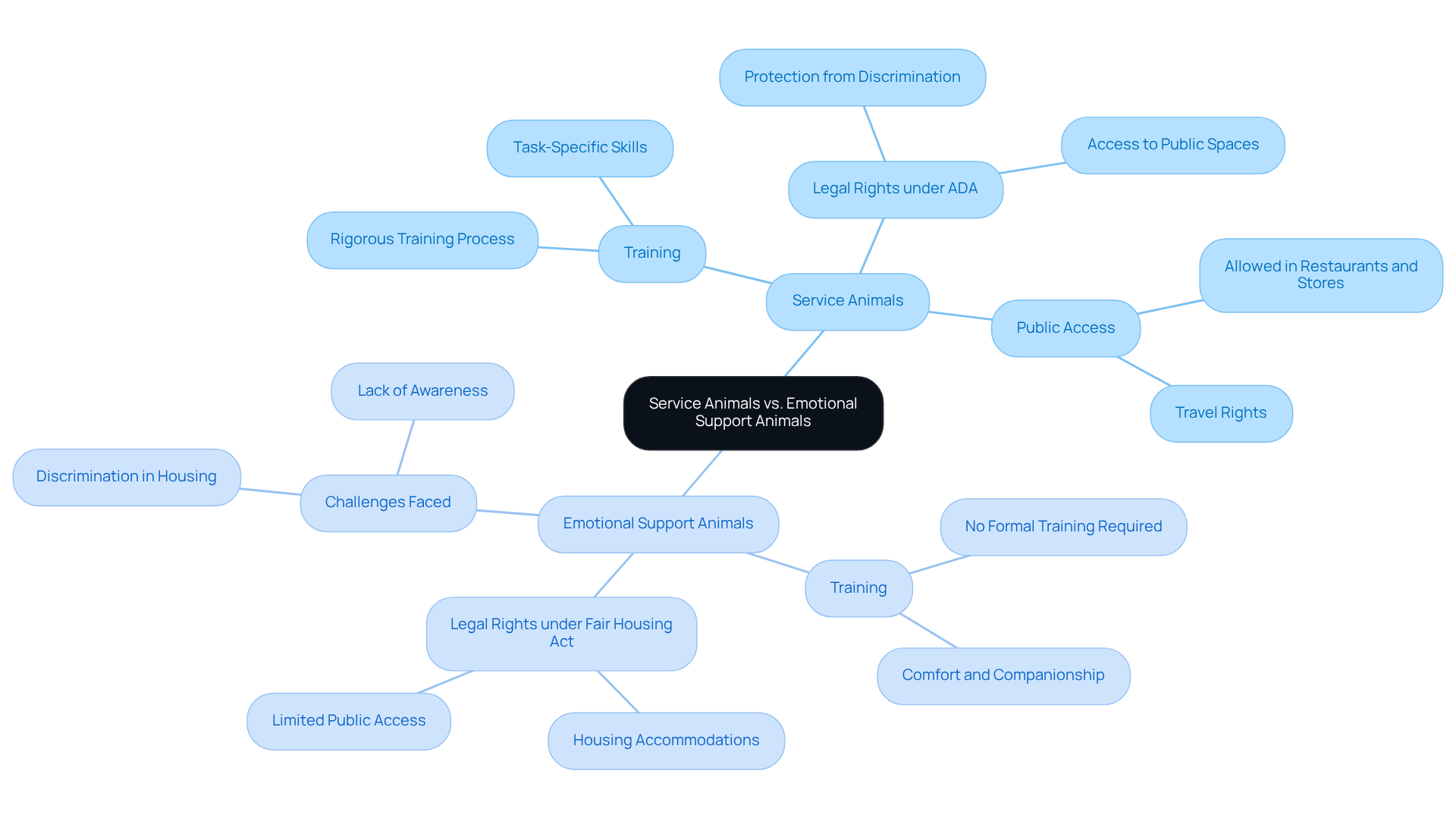
Frequently Asked Questions: Common Concerns About Emotional Support Animals in Pennsylvania
-
What is a support creature for feelings? An emotional support animal (ESA) is a beloved pet that offers comfort and companionship to individuals facing mental or emotional challenges. These animals play a vital role in enhancing well-being, and it’s heartening to note that approximately 18% of pet owners in the United States have chosen to include ESAs in their lives, underscoring their growing significance in nurturing mental health.
-
How do I qualify for an ESA? To qualify for an ESA, it’s important to have a diagnosed mental or emotional disability. You’ll need to obtain a letter from a licensed mental health professional, which confirms the necessity of having your animal by your side for emotional support. This step is crucial in ensuring you receive the comfort you deserve.
-
Can my landlord refuse my ESA? No, under the Fair Housing Act, landlords are required to accommodate your ESA, even in properties that typically enforce a no-pet policy. They can only deny your request if the specific animal poses a direct threat or would cause significant damage. This law is designed to protect your right to have your emotional support companion with you, ensuring you feel secure and supported in your home.
-
Do I need to register my ESA? There is no official registration process for ESAs. A valid ESA letter from a licensed professional is all you need to confirm your pet’s status, allowing you to focus on the love and support your animal provides.
-
Can I take my ESA on public transportation? Generally, ESAs do not have the same access rights as service animals on public transportation. It’s essential to check with the specific transit authority regarding their policies on ESAs, so you can plan accordingly and ensure your emotional support is with you when you need it.
-
What should I do if I face discrimination? If you experience discrimination concerning your ESA, it’s important to document the incidents carefully. You may file a complaint with the Department of Housing and Urban Development (HUD) or seek legal advice to better understand your rights and options. Remember, you are not alone in this journey.
These FAQs address common concerns and provide essential clarity for those considering an emotional support animal in Pennsylvania, ensuring you are aware of your rights and the regulations surrounding ESAs. Moreover, with 36% of Americans owning a pet, the connection between pet ownership and mental health is increasingly acknowledged. Wellness Wag also offers flexible payment plans starting as low as $32.25, making it easier for individuals to obtain ESA letters and embrace the support they need.
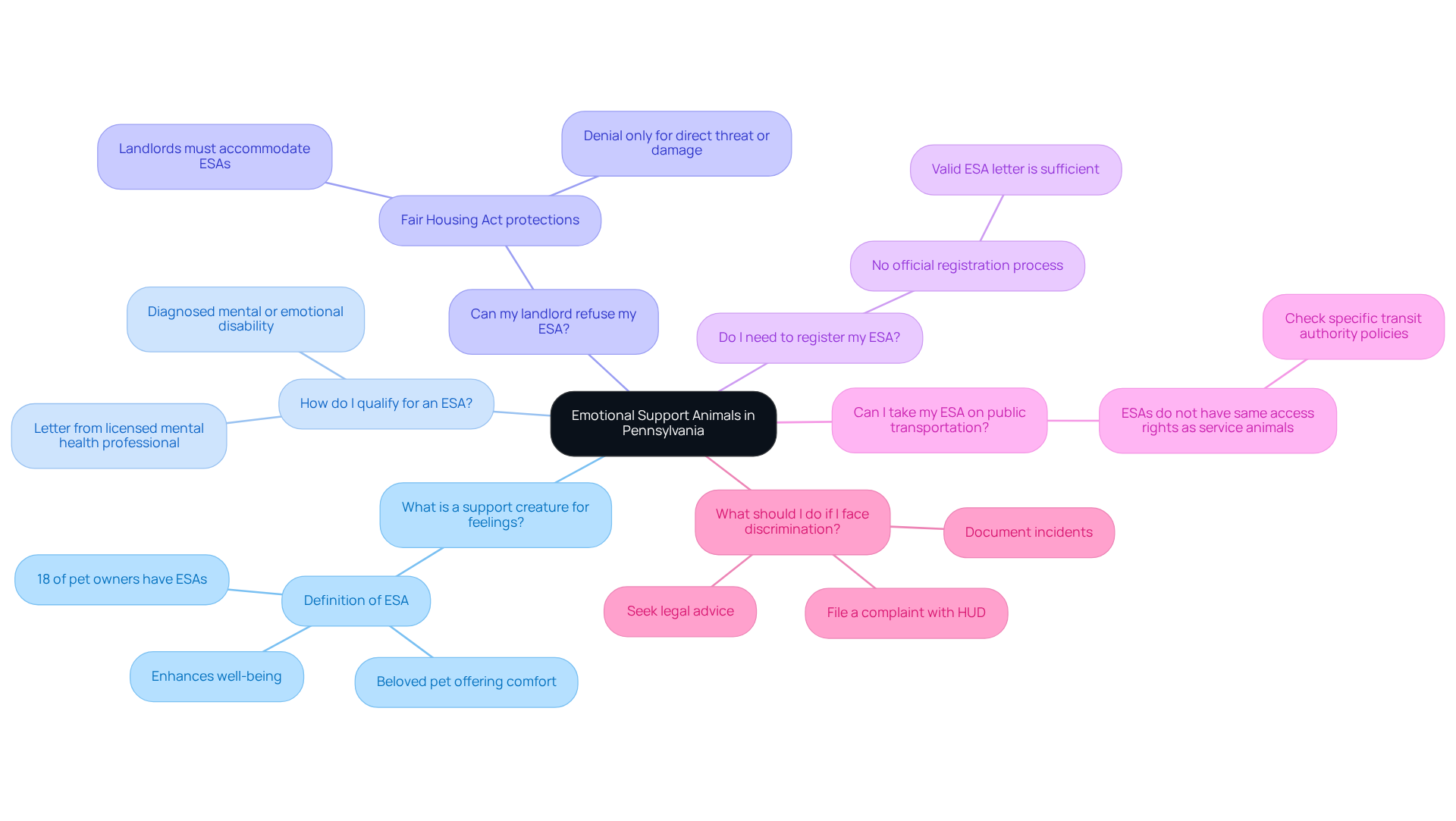
Conclusion
Understanding the rights and regulations surrounding emotional support animals in Pennsylvania is vital for individuals seeking comfort and companionship from these cherished pets. This article highlights the various aspects of obtaining an ESA letter, the protections afforded under the Fair Housing Act, and the specific rights related to housing, travel, and workplace accommodations. By navigating these guidelines, individuals can better advocate for their needs and ensure they receive the support their emotional support animals provide.
Key insights include the streamlined process offered by Wellness Wag for obtaining ESA letters, the legal protections in housing that prevent discrimination, and the importance of recognizing the differences between emotional support animals and service animals. Additionally, being informed about one’s rights under the Air Carrier Access Act and the Americans with Disabilities Act can empower individuals to effectively address any challenges they may face.
In light of the growing reliance on emotional support animals, it is crucial for individuals to remain informed about their rights and the regulations that protect them. Engaging with resources like Wellness Wag can facilitate access to necessary documentation, while understanding legal protections fosters a supportive environment for both individuals and their emotional support companions. By advocating for their rights and remaining proactive, ESA owners can navigate the complexities of housing, travel, and employment, ensuring their emotional well-being is prioritized.
Frequently Asked Questions
What is Wellness Wag and how does it help individuals obtain ESA letters in Pennsylvania?
Wellness Wag is an online platform that simplifies the process of obtaining an emotional support animal (ESA) letter in Pennsylvania. It starts with a brief assessment to determine eligibility, followed by a consultation with licensed medical professionals. Once approved, clients receive their official ESA letter within 24 hours.
What is the significance of an ESA letter?
An ESA letter confirms that an emotional support animal is essential for an individual due to a mental or psychological disability. This letter allows individuals to live with their ESA in housing that may typically prohibit pets.
How does Wellness Wag ensure customer satisfaction?
Wellness Wag offers a money-back guarantee for clients who may feel uncertain about the process or the legitimacy of their ESA letter, ensuring customer satisfaction and trust.
What are the payment options available through Wellness Wag?
Wellness Wag offers flexible payment plans starting as low as $32.25, making their services accessible to a wider audience.
What protections do individuals with ESAs have under Pennsylvania law?
Under the Fair Housing Act (FHA), individuals with valid ESA letters are allowed to live with their emotional support animals in residences that usually prohibit pets. Landlords cannot deny rental applications based solely on the presence of an ESA and cannot impose pet fees or deposits for them.
Are there any public access rights for emotional support animals in Pennsylvania?
No, emotional support animals do not have the same public access rights as service animals. However, they are protected in housing contexts under the FHA.
What responsibilities do ESA owners have regarding their pets in rental properties?
ESA owners are not required to pay pet fees or deposits; however, they are responsible for any damages caused by their pets.
How prevalent is the use of ESA letters for housing accommodations in Pennsylvania?
Recent statistics indicate that many individuals in Pennsylvania are utilizing ESA letters for housing accommodations, reflecting a growing recognition of the therapeutic benefits of pet companionship.
What should ESA owners be aware of to protect their rights?
ESA owners should be informed about their rights under the FHA, including protections against unwarranted fees, excessive documentation requests, and outright refusals by landlords. Staying informed empowers them to advocate for themselves effectively.
Certify Your Emotional Support Animal Today

Why You Can Rely on Us?
At Wellness Wag, we believe your pet deserves care rooted in both science and compassion. Each article is carefully researched, written in clear language for pet owners, and then reviewed by qualified professionals to ensure the information is evidence-based, current, and practical for real-life care. Our goal is to help you feel confident in making informed decisions about your pet’s health and well-being.
Reviewed by
Angela Morris, MSW, LCSW
Angela is a licensed clinical social worker with 20 years of experience in patient advocacy and community mental health. She has assisted numerous clients with ESA evaluations and brings a deep understanding of disability accommodations, ensuring that all information is accurate, supportive, and practical.

Written by :
Lena Park
Last Updated :
July 25, 2025












